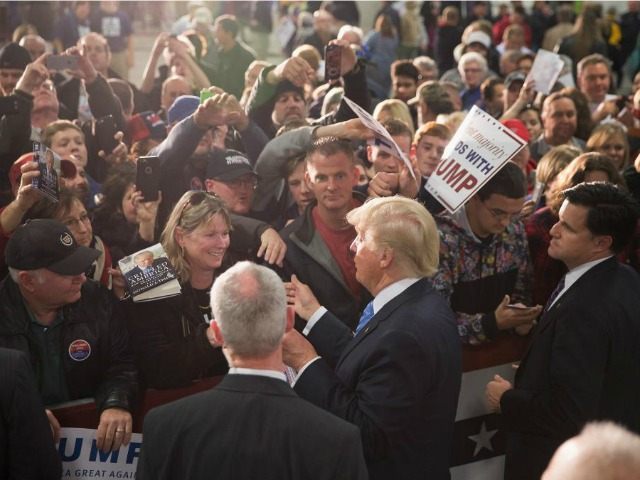On Thursday’s Breitbart News Daily (6AM to 9AM on Sirius XM Patriot channel 125), veteran NBC newsman Tom Brokaw said he credits GOP frontrunner Donald Trump for bringing in more Americans to the political process.
In a wide-ranging interview on domestic and international affairs, Brokaw told host and Breitbart News Executive Chairman Stephen K. Bannon that he “will give Mr. Trump credit” for that and joked that though some have come into the political process because they “want to do anything they can to make sure he doesn’t succeed,” others “quite obviously are involved in the process now because they have someone who speaks their mind.”
The key to Trump’s success will be how many of his supporters from outside of the traditional political system go to the polls and vote. Brokaw said that since Trump has about 30% of the support before votes have been cast, he could inherit the support of other candidates or “everybody else will consolidate around one or two candidates” once “we have a winnowing out.”
“We’ll see what happens to the poll numbers,” he said, adding that it is “heartening” that “people are really paying attention” to this election.
He also said there is an “anxiety now among the elite liberal groups about what is going on” and the rise of populism and nationalism that have powered Trump’s candidacy. Brokaw said he was recently at a book party where elite New Yorkers were talking about Trump and he had to remind attendees that “you have to understand the country doesn’t end at the Hudson River’s edge.” He said people have “different kind of requirements of how you manage your lives and what your goals are” and those living in New York will have different values than people in Livingston, Montana, where Brokaw has a ranch and spends some of his time. He said he has a lot of friends out in Montana—ranchers, live-fishing guys, barkeeps—and “they all have lots of different points of views.” He said there has to be a “determination to be open to other points of view as well.”
Regarding the war against Islamic Jihad, Brokaw said it is not like “anything quite like we’ve encountered before” with terror groups “reverting to 15th-century tactics to advance their cause” as the Shias and Sunnis fight for dominance. He said that terror groups have “touched a nerve in the wider Islamic world” and that is the “most unsettling part.”
Brokaw said that “we’re fighting a different kind of war” and acknowledged that “we have so many people getting permits” for guns because “there is great anxiety about the war coming to our shores” and more Americans think “they’re going to have to defend themselves at home.”
The Greatest Generation author said he still keeps in touch with the still “very attentive citizens” of the Greatest Generation and he said in both parties, no one “has what I see is a clear-eyed view of how we’re going to deal with this, but there’s a real urgency about it.” He said America is facing a different type of asymmetrical warfare now and not even America’s so-called allies in the Middle East “have a way of knowing how and when this might end and what victory” will look like since there is “not going to be any surrender ceremony on the Missouri” where ISIS’s flag is lowered.
Brokaw said the Bush Administration falsely thought they had a victory as soon as they got to Baghdad and “there’s been a regression” in the War on Terror “because of the development of ISIS” under the Obama administration. He said Islamic Jihad is an “overarching problem” for the West and nost just a “Republican problem or a Democratic problem” because it really is a “clash of the cultures, beliefs, and what’s in the best interest of civilization.”
Regarding Millennials, Brokaw said “their time is not over so we have to wait and see” if they turn out to be like the Greatest Generation. He said “they don’t hear a call from either party for what the reality of the situation is” in the War on Terror and only hear “exaggerated promises about what can be done.”
He said Millennials are likely willing to “play their part” like other generations but “leadership across the political spectrum doesn’t really reach out to them.”
Brokaw said he thinks that “it is immortal for a Democratic republic” to send less than 1% of the population to war while the “99%-plus of us are not asked to make any sacrifices whatsoever.” Brokaw and Bannon agreed that George W. Bush’s call to go shopping is clearly “not sacrifice.”
“It is confined to a very very small percentage of our population,” he said. “No one else is asked to think about any kind of sacrifice at home.”
To that end, Brokaw suggested a five-cent tax on gas prices where 2.5 cents would to go debt reduction/building up the military and another 2.5 cents to public works projects.
“We have to pay a price here,” he said.
Brokaw also spoke about the water crisis in Flint, Michigan. He said the failures in Flint are emblematic of how quickly working-class communities can “become victims to [government officials] who are not paying attention or regulations gone amok” and the “consequences are almost too drastic to contemplate at this point.” He said the Flint crisis “represents the frustrations of our country about the failure of our leaders and the dangers of modern life.”

COMMENTS
Please let us know if you're having issues with commenting.